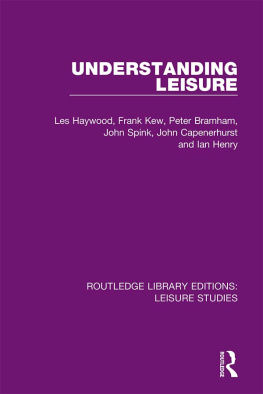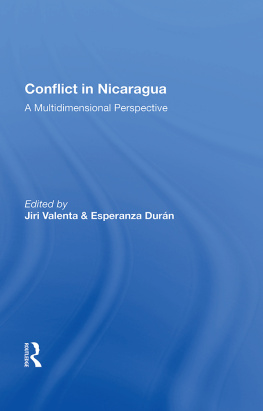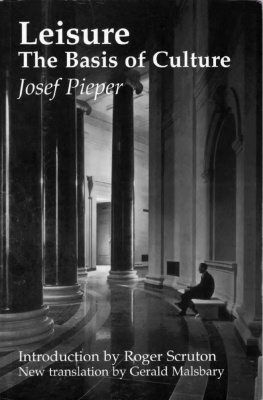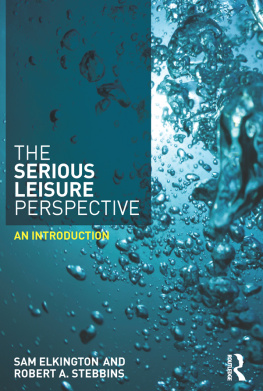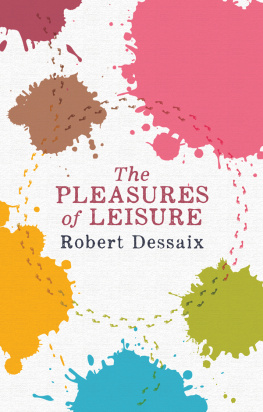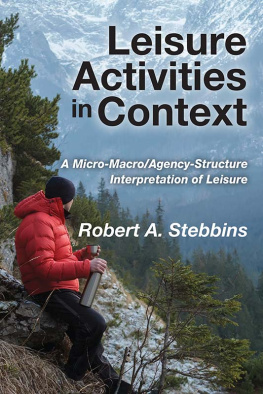Time, Leisure and Well-Being
The significance of work and leisure as elements of our social fabric have puzzled philosophers and social scientists for generations. This ambitious new study considers historical views of work and leisure alongside contemporary survey evidence about time-use and well-being. Combining sophisticated theoretical analysis with empirical research, the book presents a contrarian argument that defines leisure as a serious and stimulating challenge rather than an unqualified benefit or good. This is vital reading for anyone with an interest in the concept of time in the social sciences, worklife balance, organisational studies, or the history, philosophy, or sociology of work and leisure.
Jiri Zuzanek is Distinguished Professor Emeritus at the University of Waterloo, Canada, and formerly held appointments in the University of Lund, Sweden, Queens University, New York, and the University of Western Ontario, Canada. He was also Research Director of UNESCO European Centre for Leisure and Education, Prague. He has researched and written extensively on the sociology of leisure and popular culture and time-use, time pressure, stress, and health. He is author of: Social Research and Cultural Policy (1979); Work and Leisure in the Soviet Union (1980); World Leisure Participation (co-editor, 1996); The Effects of Time Use and Time Pressure on Child-Parent Relationships (2000); and Free Time and Leisure Participation: International Perspectives (co-editor, 2005).
Routledge Critical Leisure Studies
Series Editor: Tony Blackshaw, Sheffield Hallam University
The modern world is one that holds an intense fascination with the activities we place under the heading leisure. Rather than simply being the opposite of work, leisure today can be seen as a form of social and cultural life in which work and leisure intersect and mutually inform one another.
This series is a forum for agenda-setting research that examines our contemporary world of leisure. It places a strong emphasis not only on mapping current developments in individual and collective leisure activities, but also on challenging our understanding of these from different perspectives. Providing detailed empirical and theoretical accounts, this series explores the critical issues that underpin peoples leisure lives at the beginning of the twenty-first century.
While this series is devoted to leisure, many of its books touch on other subject fields, contributing to interdisciplinary studies and appealing to readers from across the social sciences and the humanities.
Available in this series:
1 Re-Imagining Leisure Studies
Tony Blackshaw
2 Philosophy of Leisure
Foundations of the Good Life
Johan Bouwer and Marco van Leeuwen
3 Feminisms in Leisure Studies
Advancing a Fourth Wave
Edited by Diana C. Parry
4 Whatever Happened to the Leisure Society?
A.J. Veal
5 Time, Leisure and Well-Being
Jiri Zuzanek
First published 2021
by Routledge
2 Park Square, Milton Park, Abingdon, Oxon OX14 4RN
and by Routledge
52 Vanderbilt Avenue, New York, NY 10017
Routledge is an imprint of the Taylor & Francis Group, an informa business
2021 Jiri Zuzanek
The right of Jiri Zuzanek to be identified as author of this work has been asserted by her in accordance with sections 77 and 78 of the Copyright, Designs and Patents Act 1988.
All rights reserved. No part of this book may be reprinted or reproduced or utilised in any form or by any electronic, mechanical, or other means, now known or hereafter invented, including photocopying and recording, or in any information storage or retrieval system, without permission in writing from the publishers.
Trademark notice: Product or corporate names may be trademarks or registered trademarks, and are used only for identification and explanation without intent to infringe.
British Library Cataloguing-in-Publication Data
A catalogue record for this book is available from the British Library
Library of Congress Cataloging-in-Publication Data
Names: Zuzanek, Jiri, author.
Title: Time, leisure and well-being / Jiri Zuzanek.
Description: 1 Edition. | New York: Routledge, 2020. | Includes bibliographical references and index.
Identifiers: LCCN 2020011692 (print) | LCCN 2020011693 (ebook) | ISBN 9781138666900 (hardback) | ISBN 9781315619170 (ebook)
Subjects: LCSH: Time managementCross-cultural studies. | LeisureCross-cultural studies. | Well-beingCross-cultural studies.
Classification: LCC HD69.T54 Z89 2020 (print) | LCC HD69.T54 (ebook) | DDC 650.1/1dc23
LC record available at https://lccn.loc.gov/2020011692
LC ebook record available at https://lccn.loc.gov/2020011693
ISBN: 978-1-138-66690-0 (hbk)
ISBN: 978-1-315-61917-0 (ebk)
Typeset in Baskerville
by codeMantra
To Tamara
It is appropriate at this point to express gratitude to the persons and institutions that contributed to the fruition of this book. This list would be long and the acknowledgements were included in the text of the book. I would like, however, to thank here my wife Tamara, to whom this book is dedicated, and my daughter and grandson Natasha and Alexander Graham, whose support and assistance are greatly appreciated.
Robert Nisbet, in The Sociological Tradition (1966), analyzing the sociological thought of past and present, outlined the concept of the unit-ideas of sociology. Unit-ideas are focal social concerns that generated and continue to invite conflicting interpretations, giving sociological thought its vitality and coherence. As examples of unit-ideas in the 19th-century sociology, Nisbet listed alienation, the role of the community, and the relationship between the sacred and the secular. Several criteria need to be met, according to Nisbet, to qualify as unit-ideas. These ideas must have generality, be relevant to the present and the past, and be discernable in the works of the towering minds of an age. As well, unit-ideas must be specific for the given area of study and combine insight with observation (1963: 5).
In the book that the reader has in his or her hands, I attempted to apply Nisbets notion of unit-ideas to the historical study of leisure and labour, the two concepts that, in Bennett Bergers words, have sociological meaning only vis--vis each other (1966: 28).
An attempt to identify unit-ideas, dominating the study of leisure and labour, shows that the discussion involving these phenomena centred historically upon several key and controversial issues such as (1) the role of leisure and labour in forming human identity, (2) leisure and plays role as sources of social stability, (3) leisure and labours role as stimuli of social innovation and change, (4) division of labour and its alienating effects on leisure (spillover or compensation), (5) leisures impact on the deepening or toning down of social inequalities, (6) future trends in the allocation of leisure (will we live in a society of leisure or that of a harried leisure class?), and (7) leisure and labours contribution to the well-being.
While most of these issues fall predominantly into the domain of sociological inquiry, the interest in the relationship between leisure and subjective well-being is shared by sociology and social psychology.


